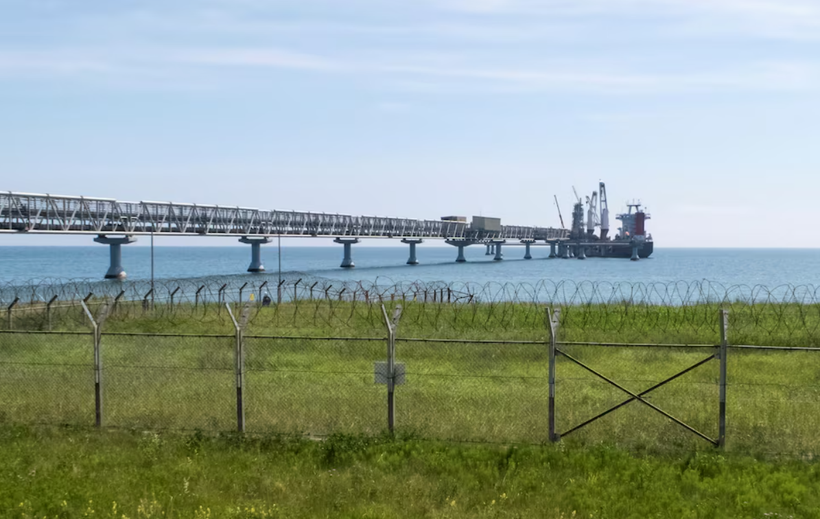US and Russian officials are secretly discussing energy agreements—from ExxonMobil’s return to the Sakhalin-1 project to Arctic LNG initiatives—in exchange for peace in Ukraine.

US and Russia Secretly Discuss Energy Deals to Encourage Ukraine Peace
Reuters, citing multiple sources, reports that US and Russian officials have been discussing a range of energy agreements on the sidelines of talks this month as a way to pursue peace in Ukraine.
These deals are being considered as a form of “incentive leverage” to encourage the Kremlin to accept a peace settlement in Ukraine and for Washington to ease sanctions imposed on Russia, sources said.
Since Russia’s February 2022 invasion of Ukraine, the country has been largely cut off from international energy investments and unable to sign major contracts.
Three sources revealed that officials discussed the possibility of ExxonMobil returning to the Sakhalin-1 oil and gas project in Russia. Exxon – the largest US oil company – had previously held talks with Rosneft, Russia’s state-owned oil company, about rejoining the project after receiving tentative approval from the US Office of Foreign Assets Control (OFAC) under both Presidents Joe Biden and Donald Trump, according to a separate source.
Additionally, officials discussed the potential for Russia to purchase US equipment for liquefied natural gas (LNG) projects, such as Arctic LNG 2, which remains under Western sanctions, according to four sources.
Another idea under consideration was the US purchasing Russian nuclear icebreakers, Reuters reported.
These discussions took place during US envoy Steve Witkoff’s visit to Moscow earlier this month, where he met with President Vladimir Putin and investment envoy Kirill Dmitriev, according to three sources. Two other sources indicated the matters were also discussed internally at the White House with Trump, and one source confirmed they were briefly mentioned at the Alaska summit on August 15.
“The White House really wanted to release a big headline after the Alaska summit, announcing a major investment deal,” one source said. “This was how Trump wanted to demonstrate that he achieved something.”
A White House official responded that Trump and his national security team continue to communicate with Russia and Ukraine toward a potential bilateral summit to end the war. “Further public negotiations on these issues do not serve the national interest,” the official emphasized.
Dmitriev’s spokesperson declined to comment. ExxonMobil did not respond. Rosneft and Novatek have yet to reply to requests.
Negotiations Coupled with Threats
Trump simultaneously threatened to impose additional sanctions on Russia if peace talks did not progress and to raise taxes sharply on India, a major buyer of Russian oil. These measures, if implemented, would make it difficult for Russia to maintain its current oil exports.
Trump’s “bargaining style” was evident in earlier exchanges on Ukraine, when officials discussed how the US could restore Russian gas flows to Europe. However, the plan was blocked by Brussels, as the EU aims to completely eliminate Russian gas by 2027.

The latest discussions have shifted focus to bilateral US-Russia deals rather than going through the European Union, which has remained steadfast in supporting Kyiv.
Notably, on the day of the Alaska summit, President Putin signed a decree allowing foreign investors, including ExxonMobil, to regain stakes in the Sakhalin-1 project—provided they act to support the lifting of Western sanctions.
Exxon exited the Russian market in 2022, recording a $4.6 billion loss. Its 30% stake in Sakhalin-1 was immediately nationalized by Russia.
The US has repeatedly tightened sanctions on Arctic LNG 2 since 2022, including prohibiting access to heavy icebreaking ships, which are essential for Arctic operations. The project is majority-owned by Novatek, which has been lobbying in Washington since last year to resume operations and lift sanctions.
According to Reuters, Arctic LNG 2 resumed limited gas processing in April, with five shipments exported this year using vessels still under sanctions. One production line had been suspended due to export difficulties. The project plans a total of three lines, with the third line intended to use technology sourced from China.
Another source said Washington aims to have Russia purchase US technology rather than Chinese, viewing this as a strategy to deepen divisions in Beijing-Moscow relations.
Previously, just days before sending troops into Ukraine, Russia and China announced a “no-limits partnership.” Over the past decade, President Xi Jinping has met Putin more than 40 times, and recently Putin referred to China as a close ally.